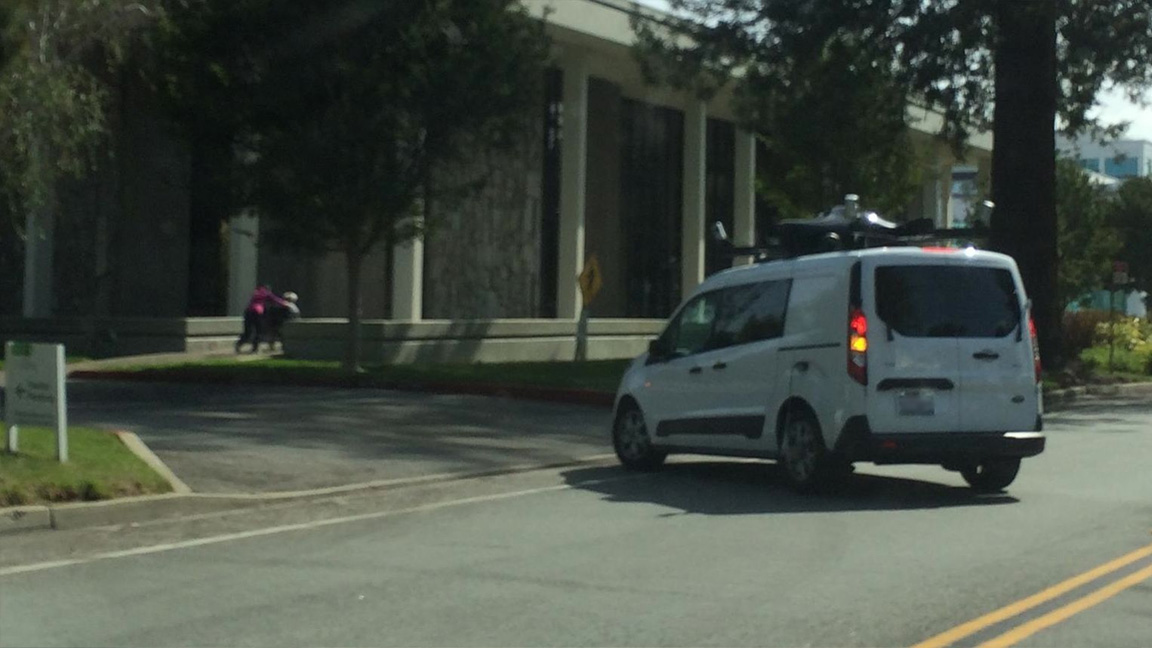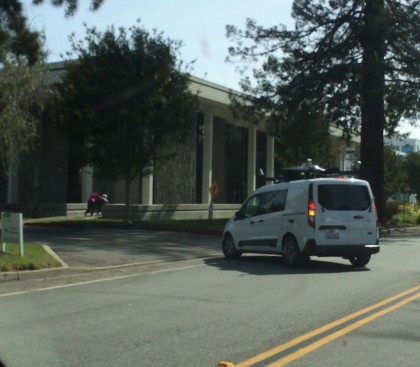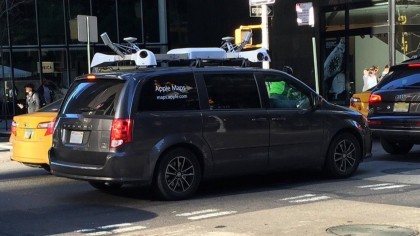Spotted: Is Apple Car self-driving tech being tested with this white van?
Exclusive: Maybe Maps, maybe not

Sign up for breaking news, reviews, opinion, top tech deals, and more.
You are now subscribed
Your newsletter sign-up was successful
Seeing weird cars is not out of the norm when you live in the Bay Area, but a white van driving around a cluster of Apple office buildings in Sunnyvale, Calif. on Thursday grabbed my attention.
At first blush, the van – a Ford Transit – appeared to be just another Apple Maps van. It had similar Lidar canisters and cameras on the roof, though was clearly a different vehicle than the Dodge Caravans gathering Maps data many, including myself, have observed cruising public roads.
"Looks like an updated version of the Apple Maps van," I thought for a hot second.

While it still could well be just that, a few noticeable differences suggested the van might possibly be related to the Apple Car or other self-driving car project by the Cupertino firm.
Lots of Lidar
For one, the configuration of the equipment on the roof is different than anything I've seen on an Apple Maps van previously. Instead of four cameras on the corners and two Lidar at the front and back of the rig, this vehicle had four Lidar on the corners and cameras (two in the rear that I could tell) positioned on the front and back.
The two rear Lidars were spinning furiously. The two in the front didn't appear to be moving or weren't moving nearly as much as the two in back, though they were harder to see clearly.
Lidar is employed by self-driving vehicles to detect objects in their surroundings, like other cars and pedestrians. Using lasers, Lidars picks up stuff that cameras may not see and figures out the distance to those objects. Google uses it on its self-driving cars, as does Ford.
Sign up for breaking news, reviews, opinion, top tech deals, and more.
While Apple Maps vans also have Lidar, the sheer number of them on this vehicle and their position at the corners are noteworthy.
There was a driver in the van who I saw, hands on the wheel, steer it out of a parking lot driveway. So, there was someone controlling the car – at least at certain points during the trip.
Once the car hit the road, I couldn't see the driver or whether he was in control of the vehicle. The van proceeded well under the speed limit down a small stretch of surface street before turning into another driveway.
Other clues
The black bump in the middle of the rig on the roof is larger than the white box on top of other Apple Maps vans. It may point to a new configuration for Apple's mapping equipment, but it also might be that it houses a larger number of sophisticated sensors for self-driving purposes.
An antenna-like sensor was attached to the rear driver-side wheel and plugged into the car, much like ones we've already seen sticking out of Dodge Caravan wheels.
Likely too low and too far down the side to be a GPS sensor on its own (those are typically on the top of self-driving cars, and could have been housed in the black box in this case), it may be an ultrasonic sensor. These are used by self-driving cars to measure distance in tight spots, such as a parallel parking job where the vehicle needs to know how close it is to other cars and the curb.
Similar rear-wheel ultrasonic sensors were mounted on early Google self-driving cars, though with its new pod car, Google has moved the sensors into the rear wheel itself.
The final clue this isn't a Maps car is that the vehicle had no tell-tale signage that I could see indicating it was being used for that purpose.
For a while, Apple Maps minivans drove around with no markings at all, leading many to speculate the tech-bedecked cars were self-driving vehicles.
Eventually Apple began putting prominent "Apple Maps" decals on the rear windows along with ones that read "maps.apple.com", as seen below. It also published a web page about the vehicles, detailing their purpose in gathering data to "improve Apple Maps."

There were no such decals or other signs indicating whether the white Transit was a Maps car - or even belonged to Apple - that I could see on the vehicle.
If not Maps, what is it?
The white van could be part of the Apple Maps fleet. While it didn't have the markings of a mapping minivan and is noticeably different than the vehicles seen before, there's always a chance it's just related to Apple's Maps efforts.
Apple is thought to be collecting its own Street View-like looks for Maps, to be implemented in later updates, so this van could be part of an endeavor to gather more detailed 3D views of the world.
But there are also signs this could very well be related to a self-driving car project. The Lidar on four corners – the better to get a 360-degree view of surroundings with – the rear-wheel sensor, and the lack of markings indicating whether it's a Maps car all suggest that it could be related to a self-driving initiative.
I doubt Apple would go public with a self-driving car project using a Ford Transit, but this particular van could have been gathering information for a future self-driving system or full-blown car. It may have been testing out equipment, sensors and the overall system during its jaunt around the Apple buildings.
It's thought the Apple Car could feature some kind of autonomous driving features, though not be fully autonomous due in no small part to affordability concerns.
Apple has stayed mum on whether it's building a car, even while others have taken the liberty to design one for the iPhone maker.
The closest hint we've gotten in any official capacity is from Apple CEO Tim Cook, who in February said waiting for the Apple Car will feel like being a kid the night before Christmas.
"It's going to be Christmas Eve for a while," he said, though notably he didn't rule out a car would be unwrapped at some point, and seemed to indicate there'd be a payoff for all the anticipation in the end.
Was the white van I saw gathering data for an autonomous driving system to be employed in the long-rumored, long-teased Apple Car? There's no way to know for sure, but it seems like a reasonable possibility.
I've asked Apple for comment on the van, and will update this story if I hear back.
- A closer look at the iPhone SE

Michelle was previously a news editor at TechRadar, leading consumer tech news and reviews. Michelle is now a Content Strategist at Facebook. A versatile, highly effective content writer and skilled editor with a keen eye for detail, Michelle is a collaborative problem solver and covered everything from smartwatches and microprocessors to VR and self-driving cars.